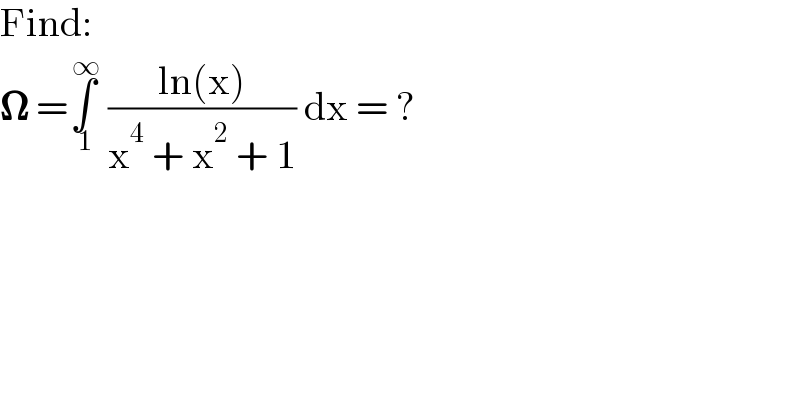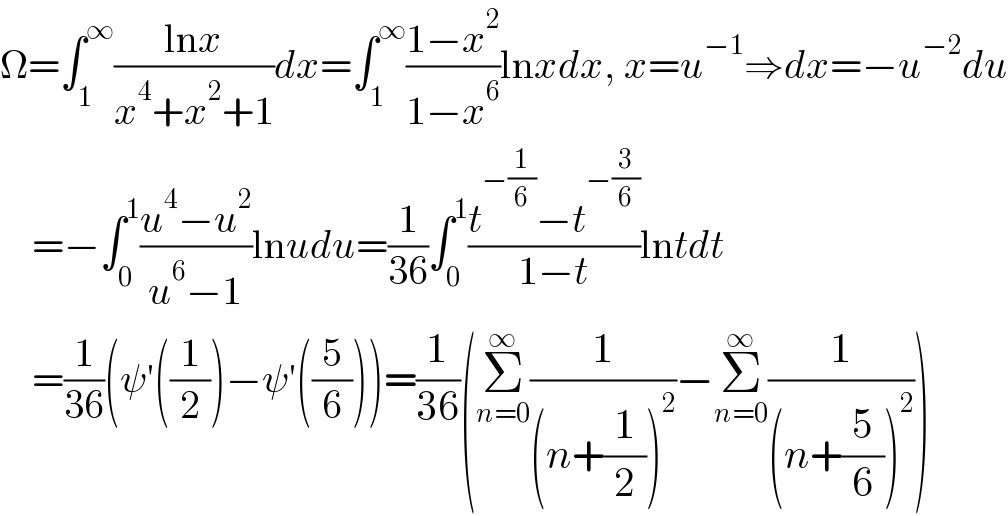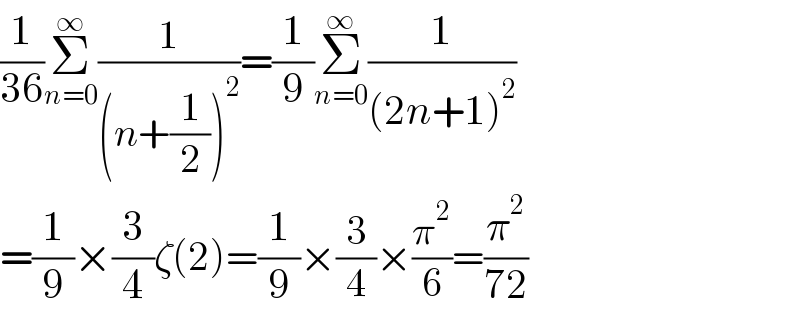Question Number 160560 by HongKing last updated on 01/Dec/21

$$\mathrm{Find}: \\ $$$$\boldsymbol{\Omega}\:=\underset{\:\mathrm{1}} {\overset{\:\infty} {\int}}\:\frac{\mathrm{ln}\left(\mathrm{x}\right)}{\mathrm{x}^{\mathrm{4}} \:+\:\mathrm{x}^{\mathrm{2}} \:+\:\mathrm{1}}\:\mathrm{dx}\:=\:? \\ $$
Answered by Ar Brandon last updated on 02/Dec/21

$$\Omega=\int_{\mathrm{1}} ^{\infty} \frac{\mathrm{ln}{x}}{{x}^{\mathrm{4}} +{x}^{\mathrm{2}} +\mathrm{1}}{dx}=\int_{\mathrm{1}} ^{\infty} \frac{\mathrm{1}−{x}^{\mathrm{2}} }{\mathrm{1}−{x}^{\mathrm{6}} }\mathrm{ln}{xdx},\:{x}={u}^{−\mathrm{1}} \Rightarrow{dx}=−{u}^{−\mathrm{2}} {du} \\ $$$$\:\:\:\:=−\int_{\mathrm{0}} ^{\mathrm{1}} \frac{{u}^{\mathrm{4}} −{u}^{\mathrm{2}} }{{u}^{\mathrm{6}} −\mathrm{1}}\mathrm{ln}{udu}=\frac{\mathrm{1}}{\mathrm{36}}\int_{\mathrm{0}} ^{\mathrm{1}} \frac{{t}^{−\frac{\mathrm{1}}{\mathrm{6}}} −{t}^{−\frac{\mathrm{3}}{\mathrm{6}}} }{\mathrm{1}−{t}}\mathrm{ln}{tdt} \\ $$$$\:\:\:\:=\frac{\mathrm{1}}{\mathrm{36}}\left(\psi'\left(\frac{\mathrm{1}}{\mathrm{2}}\right)−\psi'\left(\frac{\mathrm{5}}{\mathrm{6}}\right)\right)=\frac{\mathrm{1}}{\mathrm{36}}\left(\underset{{n}=\mathrm{0}} {\overset{\infty} {\sum}}\frac{\mathrm{1}}{\left({n}+\frac{\mathrm{1}}{\mathrm{2}}\right)^{\mathrm{2}} }−\underset{{n}=\mathrm{0}} {\overset{\infty} {\sum}}\frac{\mathrm{1}}{\left({n}+\frac{\mathrm{5}}{\mathrm{6}}\right)^{\mathrm{2}} }\right) \\ $$
Commented by HongKing last updated on 02/Dec/21

$$\mathrm{thank}\:\mathrm{you}\:\mathrm{so}\:\mathrm{much}\:\mathrm{my}\:\mathrm{dear}\:\boldsymbol{\mathrm{Sir}} \\ $$$$\mathrm{answer}:\:\:\frac{\pi^{\mathrm{2}} }{\mathrm{72}}\:-\:\frac{\mathrm{1}}{\mathrm{36}}\:\psi^{\left(\mathrm{1}\right)} \:\left(\frac{\mathrm{5}}{\mathrm{6}}\right) \\ $$
Commented by Ar Brandon last updated on 02/Dec/21

$$\frac{\mathrm{1}}{\mathrm{36}}\underset{{n}=\mathrm{0}} {\overset{\infty} {\sum}}\frac{\mathrm{1}}{\left({n}+\frac{\mathrm{1}}{\mathrm{2}}\right)^{\mathrm{2}} }=\frac{\mathrm{1}}{\mathrm{9}}\underset{{n}=\mathrm{0}} {\overset{\infty} {\sum}}\frac{\mathrm{1}}{\left(\mathrm{2}{n}+\mathrm{1}\right)^{\mathrm{2}} } \\ $$$$=\frac{\mathrm{1}}{\mathrm{9}}×\frac{\mathrm{3}}{\mathrm{4}}\zeta\left(\mathrm{2}\right)=\frac{\mathrm{1}}{\mathrm{9}}×\frac{\mathrm{3}}{\mathrm{4}}×\frac{\pi^{\mathrm{2}} }{\mathrm{6}}=\frac{\pi^{\mathrm{2}} }{\mathrm{72}} \\ $$
Commented by HongKing last updated on 02/Dec/21

$$\mathrm{Thank}\:\mathrm{you}\:\mathrm{my}\:\mathrm{dear}\:\boldsymbol{\mathrm{Sir}} \\ $$
